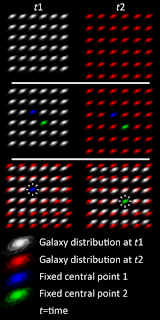
Theists are often told that there is
no evidence for God’s existence, which we obviously disagree. The evidence is the same, but the conclusions
drawn from the evidence are different.
However, there are times when a claim is made that should have evidence
for it and the absence of that evidence renders the claim highly improbable and
not worthy of belief. An example of this
is the idea of a multi-verse. If there
is a multi-verse, our universe should look very different.
In order to discuss the a naturalistic
view of the multi-verse, I must assume that an infinite number of actual
things, causes, time, etc. can exist in reality as opposed to just mathematical
concepts. I explained why I don’t
believe this is possible in a previous post, but for the sake of argument, I’m
assuming that I’m wrong. A real infinity
is necessary because in order for there to be a natural cause to the origin of
our universe, the cause must extend into the infinite past either as an
uncaused cause or an infinite series of causes.
If there is a multi-verse and no
creator, it has an infinite past and a non-zero probability of producing
universes. With an infinite amount of
time the probability of a possible event, no matter how low the probability is,
becomes irrelevant as long as that event is truly possible. At a bare minimum, we know an expanding
universe such as ours is possible. In an
infinite amount of time, there would be an infinite number of expanding universes
produced at every possible location within the multi-verse. Even the idea that different universes with
different fundamental constants would be produced is irrelevant because you
have an infinite amount of time, so there would be an infinite number of expanding
universes just like ours and an infinite number of every other possible
universe.
The multi-verse would be full of
universes because every possible space that can form a universe would form a
universe, even if there is an infinite amount of space, because there is an
infinite amount of time to fill that space.
The multi-verse would be a literal Hilbert’s Hotel; it would be full, yet
have more room for infinitely more universes.
Our universe would have collided with many other expanding universes;
some formed an infinite time ago. It
would be like a giant fireworks show; the ultimate grand finale. We would not be able to tell that our
universe is expanding because galaxies from other universes would be coming at
us and moving away from us from all directions.
The universe would appear random and chaotic because it would have been
formed randomly out of chaos.
Some say that the multi-verse is
outside of our visual range and the other universes are somewhere outside of
our universe. If this is true, there
will never be evidence for a multi-verse and the idea of the multi-verse can
never be proven true or falsified. It becomes
a claim based on blind faith, which is counter to the ideals held by the
scientific community that preaches we should only believe in things that can be
empirically verified.
The absence of evidence is not
evidence of absence, but it does make belief in the multi-verse a leap of blind
faith. There are other philosophical and
scientific problems with a naturalistic concept of the multi-verse and I hope
to cover these in a future post.
Ironically, if the multi-verse does exist, the best explanation for its
existence is a designer. In trying to
escape faith in a designer, atheists have posited an idea that requires
faith…and also a designer.


I was under the impression that when a universe expands it creates its own new space. I've heard it described that if we created a new universe inside our own, it wouldn't fill up our space and destroy us, it would instead expand into it's own space. (This was probably on a science program, such as the morgan freeman show "into the wormhole", or maybe nova). If this is the case, we wouldn't necessarily be bumping into other universes and creating a fireworks show.
ReplyDeleteI've also heard of universes being next to each other. I'm not sure how those two things together, but I have heard people who know about these things talk in both of those terms.
“when a universe expands it creates its own new space”
ReplyDeletePossibly, but then the multi-verse idea becomes blind faith without any supporting evidence….still fun for sci-fi, but more fi than sci!
Blind faith? I don't know. I've heard physicists talk in those terms a few times. I assume the mathematics, or quantum mechanics, or something at least suggests it. But honestly, I don't really know.
ReplyDeleteIt's my understanding that, while there isn't hard evidence for the multiverse yet, it is growing in popularity because it explains how our universe behaves at the quantum level. It's called the many-worlds interpretation of quantum mechanics. I don't expect you to understand or believe it, I hardly do, but the popularity of the hypothesis isn't because scientists want to disprove God, it's because they want to understand the universe and this is one of the best avenues to do so currently.
ReplyDeleteThe many worlds and multi-verse concepts are quite different. The multi-verse is the concept of multiple independent universes. The many worlds concept is the concept that there are multiple dimensions for each possible way a particle can possibly be found. I believe it comes out of the wave-particle duality problem, where some have thought every possible particle location exists in another dimension. It’s a rather untenable position to hold. Of course, having a cosmic observer or mind to observe the wave-function collapse to generate reality makes more sense. Otherwise, how was there a universe with no one to observe it? I hope to post something on this in the next couple months.
ReplyDelete